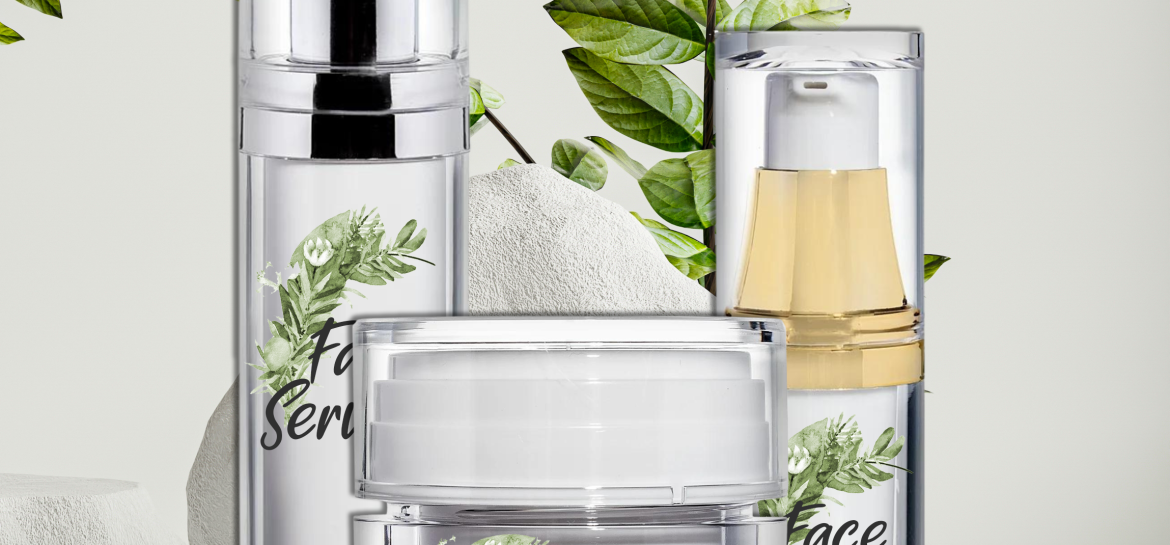
A poor substitute or a reasonable alternative? About materials that imitate glass
We have already written several times about the importance of packaging in the cosmetics and pharmaceutical industries. The role of securing a valuable substance or the marketing function are just two of the most important of them. We also mentioned the types of packaging, matching them perfectly to the product that will be carried in them. However, we have not mentioned much about the materials these packaging are made of. About their advantages, disadvantages and subtle differences between them. Such details that may not be noticed at first glance are numerous among the materials that try to imitate glass.
There are many plastics that resemble glass and are used to make cosmetic packaging. In this article, we will compare the features, advantages and disadvantages of the most famous of them, i.e. Surlyn, PMMA, PS, PETg and Glass Polymer.
Advantages and disadvantages of glass-like materials
Surlyn
It’s a plastic developed by DuPont. It is used in the production of cosmetic packaging mainly because of its similarity to glass. The material is hard, almost perfectly transparent, and is also heavy, which additionally makes it feel like a glass. What’s more, Surlyn is more impact and scratch resistant than glass, making it ideal for packaging that has to withstand harsh shipping conditions.
The disadvantages of Surlyn are its price and difficulty in processing. In addition, the material shows high hygroscopicity, which means that it can “take” water from the substance inside. For this reason, Surlyn packaging often uses an additional “thermos” inside, made of, for example, polypropylene, which does not absorb moisture.
Surlyn jar with white PP elements – source
PMMA
PMMA, also known as plexiglass or acrylic, is also a highly transparent plastic. Compared to glass or Surlyn, however, it is light. It is also easy to process, which makes it an attractive material for the production of cosmetic packaging. PMMA shows high resistance to UV radiation, which is important for products that are exposed to the sun.
The disadvantages of PMMA are low scratch and crush resistance, which makes it less durable than, for example, Surlyn.
PMMA packaging
Polystyrene (PS)
Polystyrene is also characterized by high transparency and quite high hardness. Like PMMA, however, it is much lighter than glass. It is a material which processing technology is relatively simple and well known, so the the packaging design process is less technologically limited. The advantage of PS is also its relatively low price.
The disadvantages of PS are its low durability and scratch resistance.
PS jar with PP cap
PETg
PETg is a transparent, non-crushing, impact-resistant material. Compared to polystyrene, for example, it is also scratch-resistant. It is also distinguished from PS by its better resistance to chemicals.
The disadvantages of PETg are its price, which is higher than that of PS, and the difficulty of its processing.
Glass Polymer
Glass Polymer is another glass substitute, but distinguished by high flexibility. Glass Polymer is also more flexible, which makes it more resistant to damage during transport and storage. Glass Polymer is also more resistant to chemicals than glass.
The disadvantages of Glass Polymer is its price, which is higher.
Glass polymer packaging
Which material to choose?
There is no clear answer here. It all depends on what you expect from the packaging. But it is worth noting, that all of the above plastic materials are less breakable than glass and feel warm to the touch. Glass, on the other hand, has been labeled as an ecological and solid material. In recent years, the development of recycling processes and the creation of packaging wchich are simple to disassemble has significantly reduced its environmental impact and even increased their quality.
Before deciding on the best solutions for your cosmetic, remember to prepare the budget, visual expectations, possibilities of changing the color during the development of the product line, the design of logos, labels and smaller graphic elements. When ordering at Glass&Co, our experienced purchasing managers will help you choose the best solution – both in terms of material, technical parameters, decoration options and price.



